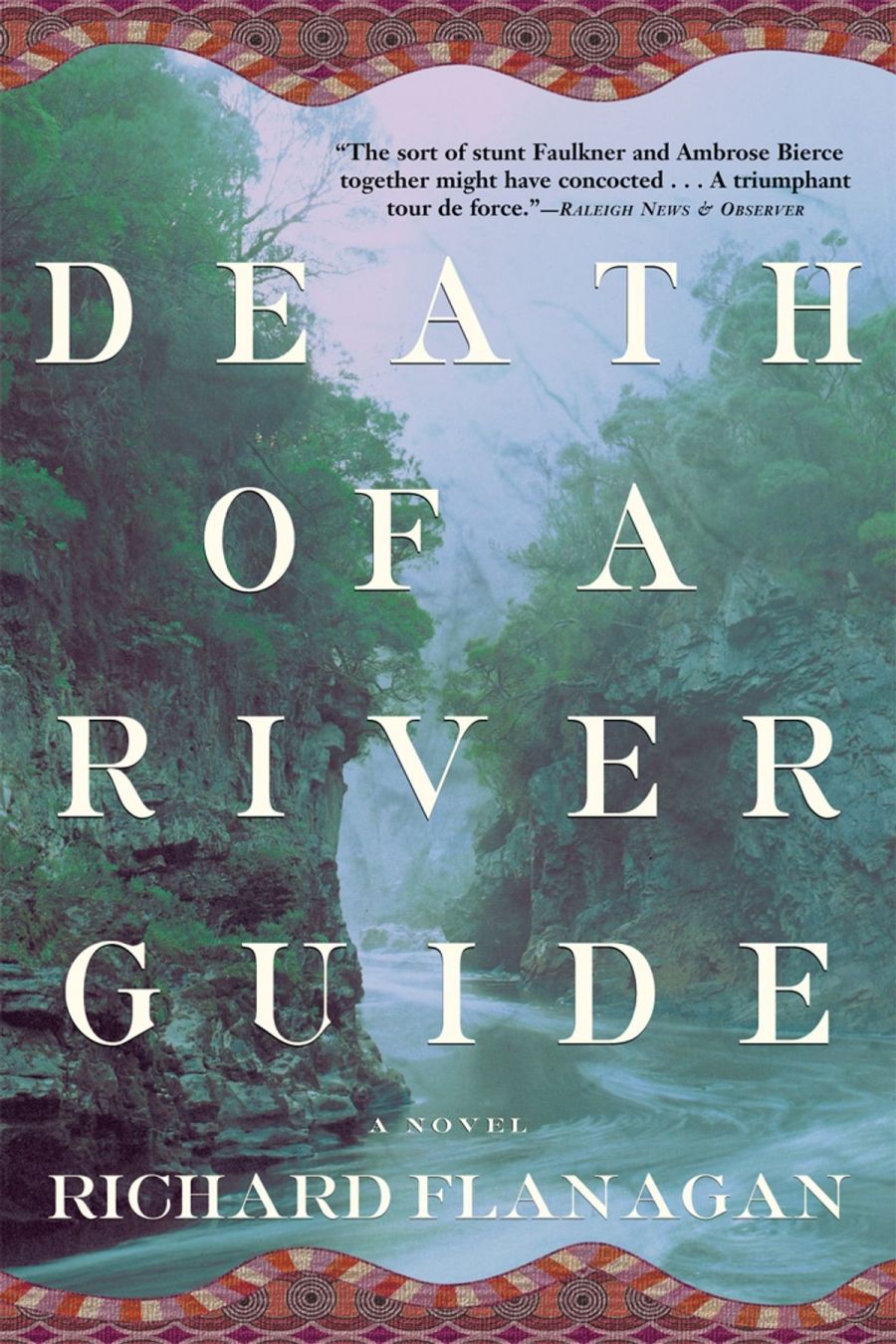
- Free Article: No
- Contents Category: Fiction
- Review Article: Yes
- Online Only: No
- Custom Highlight Text:
Before you start this novel, take a big, deep breath. Aljaz Cosini – riverguide, ex-footballer, drifter – is drowning, and we’re going along for the ride. There he is, stuck fast beneath the surface of Tasmania’s Franklin River, hopelessly wedged between rocks, his one free arm waving grotesquely to the unlikely band of adventurers who have paid for his services. The irony isn’t lost on him. Not much is lost on him at all. It seems his whole life, from his miraculous birth (struggling to break free from the restrictive sac of amniotic fluid) to his final humiliation on the river, has been leading inevitably to this moment. And now the river carries not only his own past but the pasts of all those who have gone before him like a great tide of stories washing over him, pushing him down, forcing more and more water into his lungs. Stories, stories, stories. A world and a land and even a river full of the damn slippery things.
- Book 1 Title: Death of a River Guide
- Book 1 Biblio: McPhee Gribble, $14.95 pb
- Book 1 Readings Link: booktopia.kh4ffx.net/BmEjx
The stories played out in front of Aljaz’s drowning eyes during that final, drawn-out moment of release invest the book with a haunting, magical quality. They are told with such confidence and assuredness, such a feel for the rhythms of language and the strength of narrative that we barely pause to question their plausibility. Indeed, if it weren’t for Flanagan’s own occasional lapse of confidence in his narrator, his urge to remind us of the unlikely circumstances surrounding the visions and visitations, we would happily suspend our disbelief for the duration of the novel. It’s enough that the stories are being told and all we need to do is listen.
If there is wonder and lyricism and celebration of the strangeness of life in this book, there is also a bleak, dark current running through it. It comes from the stories that press most heavily on Aljaz as he comes to recognise them as his own. These are stories drawn from the catalogue of horrors that makes up much of white Tasmania’s history: stories of a brutal convict past; bolters eating each other as they make their way towards the New Jerusalem; Aboriginal skeletons in the dunes, William Lanne’s stolen skull (a story which brings a new, horrific currency to the notion of skeletons in the family closet).
Like his narrator (telling tales to scare and satisfy the morbid expectations of the tourists), Flanagan is aware of Tasmania’s gothic potential. He is also aware of the weight of history and how it holds us captive. Aljaz Cosini, in his dying moments, confronts the truth that underlies Tasmania’s history. If you leave you can never be free. The past, the brutality, the wrongs and injustices must be faced rather than avoided. For him, it’s unsurprising that he has returned to the south-west to die in this river which (as his visions reveal to him) he is so much a part of. Only by returning could he find release.
If there’s a moral implication here, Flanagan avoids shallow moralising. Rather there is deep sadness and sense of loss at the heart of the book. It is an extended lyrical elegy for a whole series of lost opportunities, lost people, lost children, relatives, species, forests, rivers. Without being narrowly political or idea logical, Flanagan reminds us that we have allowed this to happen and that we must acknowledge it.
Tempering the sense of loss and regret is Flanagan’s awareness of the comfort to be drawn from others and the almost religiously redemptive qualities to be gained from seeing one’s self as part of some vast interconnected scheme. Aljaz Casini operates largely as a representative character, a loner who feels he doesn’t belong but whose genealogy branches out like an extensive river system to embrace Aboriginal stories, Celtic stories, stories from Italy, England, Yugoslavia, and China. He is none of us and all of us, and we are all part of each other.
If the controlling narrative line of the novel is the singular journey downstream, it refuses to be constrained by that. Tributaries and rivulets branch outwards and away from the river to claim more and more as their own, as if the great torrent of the Franklin has somehow been reversed (like a film run backwards), and we are beating our way upstream, away from the horrible inevitability of where it will end, back to the source which, for Flanagan, is a marvellously mythologised history that connects us all to each other and to the land.
There is a great sense of humanity about this book, a concern for the spirit as well as for the trials of physical existence. In some ways it reminds me of Tim Winton’s Cloudstreet, in other ways, it reminds me on1y of itself. Despite (or perhaps because of) the inevitability of the narrator’s demise, it is ultimately an uplifting and immensely rewarding book.


Comments powered by CComment